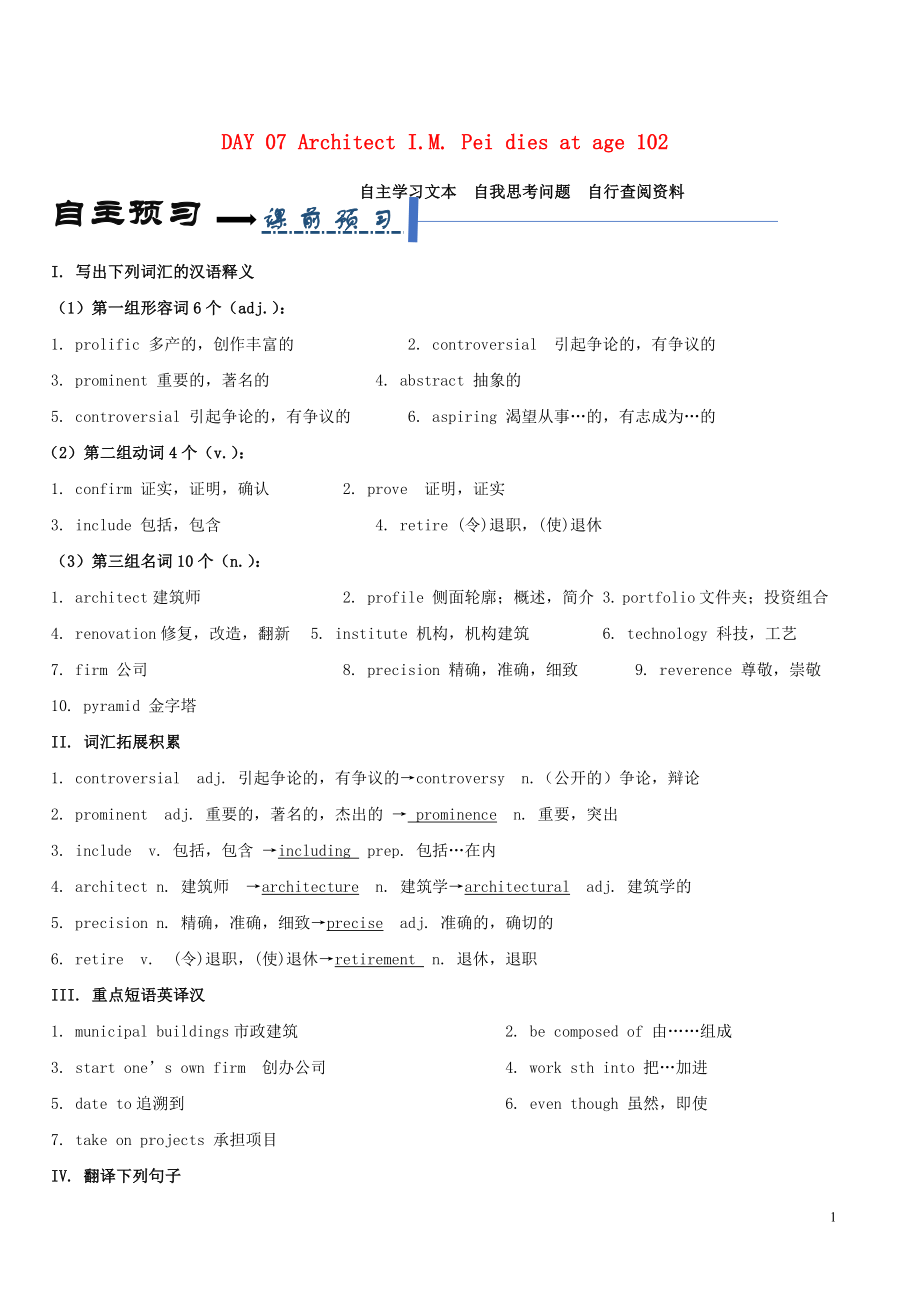《備戰(zhàn)2020年高考英語(yǔ) 每日一篇 DAY 07 懷念一代建筑大師貝聿銘(含解析)》由會(huì)員分享����,可在線閱讀,更多相關(guān)《備戰(zhàn)2020年高考英語(yǔ) 每日一篇 DAY 07 懷念一代建筑大師貝聿銘(含解析)(8頁(yè)珍藏版)》請(qǐng)?jiān)谘b配圖網(wǎng)上搜索����。
1、自主預(yù)習(xí)
課前預(yù)習(xí)區(qū)
DAY 07 Architect I.M. Pei dies at age 102
自主學(xué)習(xí)文本 自我思考問題 自行查閱資料
I. 寫出下列詞匯的漢語(yǔ)釋義
(1)第一組形容詞6個(gè)(adj.):
1. prolific 多產(chǎn)的����,創(chuàng)作豐富的 2. controversial 引起爭(zhēng)論的,有爭(zhēng)議的
3. prominent 重要的����,著名的 4. abstract 抽象的
5. controversial 引起爭(zhēng)論的����,有爭(zhēng)議的 6. aspiring 渴望從事…的����,有志成為…的
(2)第二
2、組動(dòng)詞4個(gè)(v.):
1. confirm 證實(shí)����,證明,確認(rèn) 2. prove 證明����,證實(shí)
3. include 包括,包含 4. retire (令)退職����,(使)退休
(3)第三組名詞10個(gè)(n.):
1. architect建筑師 2. profile 側(cè)面輪廓;概述����,簡(jiǎn)介 3. portfolio 文件夾����;投資組合
4. renovation修復(fù)����,改造����,翻新 5. institute 機(jī)構(gòu),機(jī)構(gòu)建筑 6. technology 科技����,工藝
7. firm 公司 8. precision 精確,準(zhǔn)確����,細(xì)致 9. revere
3、nce 尊敬����,崇敬
10. pyramid 金字塔
II. 詞匯拓展積累
1. controversial adj. 引起爭(zhēng)論的,有爭(zhēng)議的→controversy n.(公開的)爭(zhēng)論����,辯論
2. prominent adj. 重要的,著名的����,杰出的 → prominence n. 重要����,突出
3. include v. 包括����,包含 →including prep. 包括…在內(nèi)
4. architect n. 建筑師 →architecture n. 建筑學(xué)→architectural adj. 建筑學(xué)的
5. precision n. 精確,準(zhǔn)確����,細(xì)致→prec
4、ise adj. 準(zhǔn)確的����,確切的
6. retire v. (令)退職,(使)退休→retirement n. 退休����,退職
III. 重點(diǎn)短語(yǔ)英譯漢
1. municipal buildings市政建筑 2. be composed of 由……組成
3. start one’s own firm 創(chuàng)辦公司 4. work sth into 把…加進(jìn)
5. date to追溯到 6. even though 雖然,即使
7. take on projects 承擔(dān)項(xiàng)目
IV. 翻譯
5����、下列句子
1. I.M. Pei, whose modern designs and high-profile projects made him one of the best-known and most prolific architects of the 20th century, has died. He was 102.
翻譯:貝聿銘先生與世長(zhǎng)辭,享年102歲����。,他的建筑作品設(shè)計(jì)現(xiàn)代����、引人注目,使他成為20世紀(jì)最著名和最多產(chǎn)的建筑師之一����。
2. Pei, whose portfolio included a controversial renovation of Paris
6、’ Louvre Museum and the Rock and Roll Hall of Fame(搖滾名人堂)in Cleveland, died overnight, his son Chien Chung Pei told The New York Times. NBC News confirmed Pei’s death.
翻譯:貝聿銘之子貝建中證實(shí)����,其父于深夜溘然離世。巴黎盧浮宮博物館頗具爭(zhēng)議的翻修工程����、以及克利夫蘭的搖滾名人堂,均是貝先生的杰作����。
3. Ieoh Ming Pei, the son of a prominent banker in China, left hi
7、s homeland in 1935, moving to the United States and studying architecture at the Massachusetts Institute of Technology and Harvard University.
翻譯:貝聿銘是一位杰出的中國(guó)銀行家之子����。1935年����,他背井離鄉(xiāng)來(lái)到美國(guó)����,先后在麻省理工學(xué)院和哈佛大學(xué)攻讀建筑學(xué)。
4. After teaching and working for the U.S. government, he went to work for a New York developer in
8����、 1948 and started his own firm in 1955.
翻譯:他當(dāng)過老師,也服務(wù)過美國(guó)政府����;1948年,他來(lái)到一家紐約的地產(chǎn)開發(fā)商工作����,1955年時(shí)他創(chuàng)立了自己的公司。
5. The museums, municipal buildings, hotels, schools and other structures that Pei built around the world showed precision geometry and an abstract quality with a reverence for light.
翻譯:貝聿銘在世界各地建造了許多
9����、博物館、市政大樓����、酒店����、學(xué)校和其他建筑����,這些作品都展現(xiàn)了精確的幾何結(jié)構(gòu)和抽象的風(fēng)格����,表達(dá)了貝聿銘對(duì)光線的尊敬。
你的感悟:
06
懷念一代建筑大師貝聿銘
課程導(dǎo)讀
2019年5月16日����,世界著名的華裔建筑大師貝聿銘在紐約去世,享年102歲����。曾獲得1979年美國(guó)建筑學(xué)會(huì)金獎(jiǎng)、1981年法國(guó)建筑學(xué)金獎(jiǎng)����、1989年日本帝賞獎(jiǎng)、1983年第五屆普利茲克獎(jiǎng)及1986年里根總統(tǒng)頒予的自由獎(jiǎng)?wù)碌?���,被譽(yù)為“現(xiàn)代建筑的最后大師”����。 貝聿銘作品以公共建筑����、文教建筑為主,被歸類為現(xiàn)代主義建筑����,善用鋼材、混凝土����、玻璃與石材,代
10����、表作品有巴黎盧浮宮擴(kuò)建工程、香港中國(guó)銀行大廈����、蘇州博物館新館等。
本文節(jié)選自 Reuters (路透社)
Architect I.M. Pei stands inside of the construction site for the Louvre’s inverted pyramid. He designed the glass and metal pyramids to serve as an entrance to the Louvre museum. Paris, Fra
11����、nce.
Architect I.M. Pei dies at age 102
I.M. Pei, whose modern designs and high-profile projects made him one of the best-known and most prolific architects of the 20th century, has died. He was 102.
Pei, whose portfolio included a controversial renovation of Paris’ Louvr
12����、e Museum and the Rock and Roll Hall of Fame(搖滾名人堂) in Cleveland, died overnight, his son Chien Chung Pei told The New York Times. NBC News confirmed Pei’s death.
Ieoh Ming Pei, the son of a prominent banker in China, left his homeland in 1935, moving to the United States and stu
13����、dying architecture at the Massachusetts Institute of Technology and Harvard University. After teaching and working for the U.S. government, he went to work for a New York developer in 1948 and started his own firm in 1955.
The museums, municipal buildings, hotels, schools and ot
14、her structures that Pei built around the world showed precision geometry and an abstract quality with a reverence for light. They were composed of stone, steel and glass and, as with the Louvre, he often worked glass pyramids into his projects.
The Louvre, parts of which date to the
15����、 12th century, proved to be Pei’s most controversial work, starting with the fact that he was not French. After being chosen for the job by President Francois Mitterrand amid much secrecy, Pei began by making a four-month study of the museum and French history.
16����、
Ieoh Ming Pei, the son of a prominent banker in China, left his homeland in 1935, moving to the United States and studying architecture at the Massachusetts Institute of Technology and Harvard University. After teaching and working for the U.S. government, he went to work for a New York develop
17、er in 1948 and started his own firm in 1955.
When Pei won the international Pritzker Architecture Prize in 1983, he used the $100,000 award to start a program for aspiring Chinese architects to study in the United States.
Even though he formally retired from his firm in 1990, Pei was still taking on projects in his late 80s, such as museums in Luxembourg, Qatar and his ancestral home of Suzhou.
8
 備戰(zhàn)2020年高考英語(yǔ) 每日一篇 DAY 07 懷念一代建筑大師貝聿銘(含解析)
備戰(zhàn)2020年高考英語(yǔ) 每日一篇 DAY 07 懷念一代建筑大師貝聿銘(含解析)

